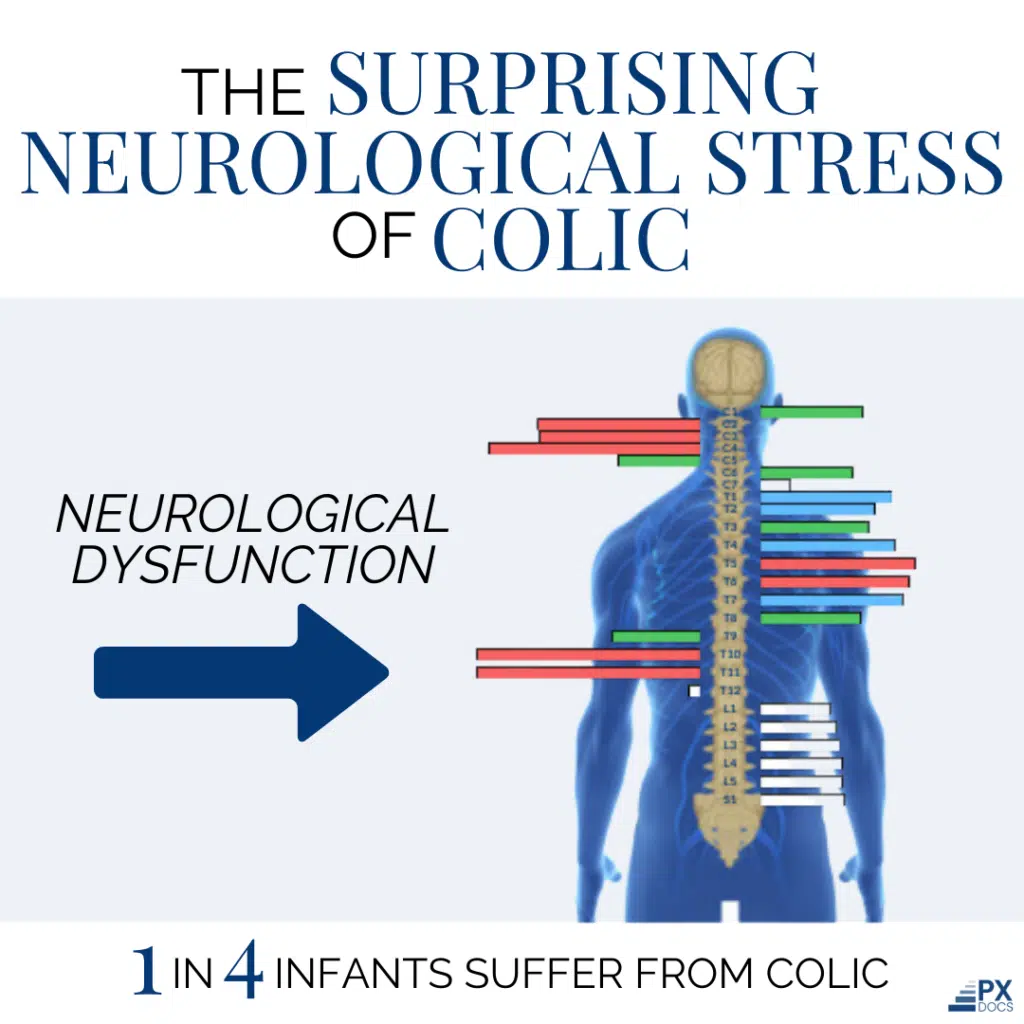If your baby cries inconsolably for hours on end, you know how incredibly frustrating and helpless it can feel. You’re desperate to soothe your baby’s distress, but nothing seems to work. The exhaustion and worry can be overwhelming, leaving you wondering if you’re doing something wrong or if there’s something seriously wrong with your little one.
First and foremost, know that you are not alone. Colic is surprisingly common, affecting up to 1 in 4 infants. And while the medical community is still searching for answers, there is hope. At PX Docs, we take a different approach to colic, looking beyond the digestive issues to the underlying neurological dysfunction at the root of your baby’s distress.
We also fully understand that your baby’s constant cries are not something to simply “dismiss” and say “don’t worry about” which parents tell us they hear way too often from their conventional pediatrician when they bring up their concerns, ask questions, and look for help.
In this article, we’ll dive deep into what colic really is, what causes it, and, most importantly, what you can do to help your colicky baby (and entire family) find some relief.
What is Colic?
Colic is defined as intense, prolonged, and frequent crying in an otherwise healthy infant. The “rule of threes” is often used to diagnose colic: crying for more than three hours a day, more than three days a week, for more than three weeks.
While it’s normal for babies to cry, colic is excessive crying that can be incredibly stressful for both infants and parents. A colic baby may cry inconsolably for hours on end, often in the evening, leaving caregivers feeling frustrated, exhausted, and helpless. This can affect the whole family’s emotional well-being and quality of life.
Some of the symptoms of colic babies may exhibit include:
- Intense crying that sounds more like screaming or an expression of pain
- Crying for no apparent reason, not due to hunger or a dirty diaper
- Crying at the same time each day, often in the late afternoon or evening
- Facial flushing and a red, scrunched-up face
- Clenched fists, arched back, and tightened abdominal muscles
- Passing gas or burping due to swallowing air while crying
It’s important to remember that these symptoms of colic can also indicate other issues, such as an illness, constipation, or food sensitivity.
It’s tempting to stress out over each of these issues, but the reality is that if your baby has colic, and is experiencing other issues, there’s likely a neurological root cause.
Why Your Baby Cries For Hours a Day: Causes of Colic
Despite its prevalence, the exact causes of colic are not fully agreed on. Conventional theories often attribute colic to digestive issues, such as gas, reflux, or food sensitivities. However, research has shown that these factors alone do not fully explain the condition.
At PX Docs, we view colic through a neurophysiological lens.
We know that the root cause of colic symptoms often lies in neurological dysfunction, specifically in the autonomic nervous system (ANS). The ANS controls involuntary functions like heart rate, digestion, and sleep and is heavily influenced by the vagus nerve. This long, wandering nerve extends from the brainstem to the abdomen, serving as the most essential component of the parasympathetic nervous system, which activates and stimulates digestive motility and so many other important physiological functions thought to be disrupted in cases of infantile colic
When the ANS is out of balance, it can result in a state called dysautonomia. In this state, the “fight or flight” sympathetic nervous system becomes overactive, while the “rest and digest” parasympathetic nervous system is underactive.
This imbalance can lead to a range of symptoms, including excessive crying, difficulty sleeping, and digestive distress—all hallmarks of colic.
Understanding the Role of “The Perfect Storm”
So, what causes this autonomic dysfunction in colicky infants? We find that it’s often a combination of factors that we call “The Perfect Storm“:
- Prenatal stress: Maternal stress during pregnancy can impact the developing nervous system of the fetus, potentially setting the stage for dysautonomia later on.
- Birth interventions: Procedures like c-sections, forceps or vacuum deliveries, and even seemingly routine interventions can cause physical stress and trauma to an infant’s delicate spine and nervous system.
- Subluxation and Nervous System Dysregulation: This physical stress can result in interference within nervous system communication, particularly along the track of the vagus nerve. We call these subluxations, and they can disrupt normal nervous system communication.
- Environmental stressors: Overstimulation, irregular routines, and other stressors in an infant’s environment can further exacerbate autonomic dysfunction.
Research is beginning to support this neurological view of colic. Studies have shown differences in vagal tone (a measure of autonomic function) between colicky and non-colicky infants, as well as improvements in colic symptoms following interventions that target the nervous system.
Fortunately, by understanding the neurological root of colic, we can move beyond temporary symptom management and instead focus on restoring healthy nervous system function.

Diagnosing Babies with Colic
If your baby is crying for more than 3 hours a day and is exhibiting other colic symptoms, a healthcare provider will likely diagnose them with colic and tell you it’s normal, something for infants to grow out of.
While colicky babies may stop crying eventually, the root issues of colic are likely still lingering.
In our clinical practice, we’ve seen time and again that babies do not “grow out of” colic but instead “grow into” the next wave of health challenges such as constipation, ear and other respiratory infections, sleep disorders, and sensory integration disorders. We even see colic frequently as an early warning sign of autism.
The cause of colic is quite simple – distress.
At PX Docs, we take colic diagnosis a step further with our cutting-edge INSiGHT Scans. These non-invasive scans allow us to objectively measure the autonomic nervous system function and pinpoint areas of neurological stress in colicky babies. This detailed information helps guide our care recommendations and track progress over time.
When Diet Changes Don’t Work
Many moms, especially those who are breastfeeding, will try eliminating potential trigger foods from their diets to soothe their colicky baby. Common culprits include dairy, soy, caffeine, spicy foods, and gas-producing veggies like broccoli and cabbage. Some families will try switching to hypoallergenic formulas or cutting out entire food groups.
While these dietary changes can occasionally provide some relief, the crying and discomfort persist for many babies despite all the dietary tweaks and restrictions. This can be incredibly frustrating and disheartening for parents who feel like they’ve tried everything.
If this sounds familiar, it’s important to understand that while gut health and nutrition are certainly significant pieces of the puzzle regarding colic, they are not the whole picture.
Think about this: what would the most palatable food on planet Earth be? Mother’s milk, right? Some research suggests that a mother’s milk is actually customized to the baby’s needs, communicated via the compounds in the baby’s saliva.
So if this customized baby food, which should be the most digestible, bioavailable food on the planet, isn’t digestible, is the milk the problem?
Colic often results from an imbalance in the autonomic nervous system that diet alone cannot fully address.
The gut-brain connection is real, and an infant’s immature digestive system can certainly be impacted by what they (or mom) are eating. But the nervous system is the master controller, directing all functions of the body including digestion. When the nervous system is stuck in that “fight or flight” overdrive, it can lead to impaired digestion, inflammation, and yes – colic symptoms.
So, while diet changes can be useful tools in managing colic, they are often not sufficient on their own. That’s where interventions like chiropractic care come in, helping to restore balance to the nervous system and promote optimal digestive function from the top down.
If you’ve exhausted all the dietary strategies and your baby is still struggling with colic, it’s time to look deeper. Seeking out a neurologically-focused approach can be the missing piece in finally bringing relief to your baby and your whole family.
A New Approach for Colicky Babies
Conventional colic treatments often focus on managing symptoms, such as trying different formulas or diet changes, using gas drops, or altering feeding positions. While these techniques may provide some relief, they don’t address the underlying neurological dysfunction that can perpetuate colic symptoms.
At PX Docs, we take a different approach.
Our Neurologically-Focused Chiropractic Care aims to restore balance to the autonomic nervous system by gently addressing areas of subluxation and promoting healthy vagal tone.
Our doctors use precise adjustments tailored to infants’ unique needs. The adjusting techniques used to help calm and regulate infants in distress incorporate light touch and soft pressure to stimulate the vagus nerve and parasympathetic system, and are markedly different than more traditional “structural” or “physical” type adjustments often provided by traditional chiropractors to adults with spinal or musculoskeletal issues.
In addition to chiropractic adjustments, we also provide guidance on supportive practices like:
- Creating a calm, responsive environment
- Establishing predictable routines
- Using movement-based relaxation techniques
- Babywearing to promote bonding and soothing
- Encouraging tummy time for neurodevelopment
- Talking through any supportive dietary or supplement recommendations
By combining targeted neurological support with nurturing practices, we empower parents to promote their baby’s overall well-being and resilience.
Colic Case Study
Nicholas’s parents were disheartened that they were facing the same situation again. They had previously dealt with colic when their first baby was born, so when Nicholas started crying for 16 hours a day, they felt helpless and heartbroken.
They thought he was suffering from extreme gas pains and tried using gas drops, changing formulas, and special bottles, but nothing seemed to work. They were desperate to see their sweet baby smile.
As Neurologically-Focused Pediatric Chiropractors, we frequently encounter stories and situations like these.
After three adjustments, Nicholas started sleeping better, crying less, and experiencing an improvement in his gas pains. He also showed better head movement. As his treatment continued, the smiles became more frequent, and their entire life changed.
Below on the left is Nicholas’s initial INSiGHT scan, pinpointing severe stress (red), especially in the upper neck. This neurological region has significant control over the body’s rest, relaxation, and digestive functions. This meant Nicholas felt really uncomfortable in his own skin and had to work hard to eat, sleep, and poop.
As he progressed through his care plan, his scans started to calm and regulate, as you can see on the right. This shows that his nervous system became much less stressed, allowing his colic symptoms to subside completely.
His mom says, “Nicholas sleeps through the night, naps during the day, no longer has gas pains, and has a full range of motion in his neck. He is such a happy baby who smiles, laughs, and ‘talks’ to us all the time! People do not believe me when I tell them what we went through for the first 8 weeks! He is a totally different baby and we couldn’t be happier for him! And us!”
Finding Hope and Healing for Babies with Colic
Colic can be an incredibly challenging and isolating experience for families. But you don’t have to face it alone. At PX Docs, we provide the support, guidance, and expertise you need to help your baby find lasting relief.
Our approach is grounded in the latest research on the autonomic nervous system’s role in infant health and development. By focusing on the root cause of colic rather than just managing symptoms or hoping they “grow out of it” over time, we help families achieve results that last well beyond the colicky phase.
If your baby is struggling with colic, we invite you to visit our PX Docs Directory to find a trained provider near you. With our compassionate, neurologically-focused care, you can help your baby—and your whole family—find the calm and comfort you deserve.
Don’t let colic steal one more precious moment. Take the first step towards healing today, and discover the difference that PX Docs can make for your baby’s health and happiness.





